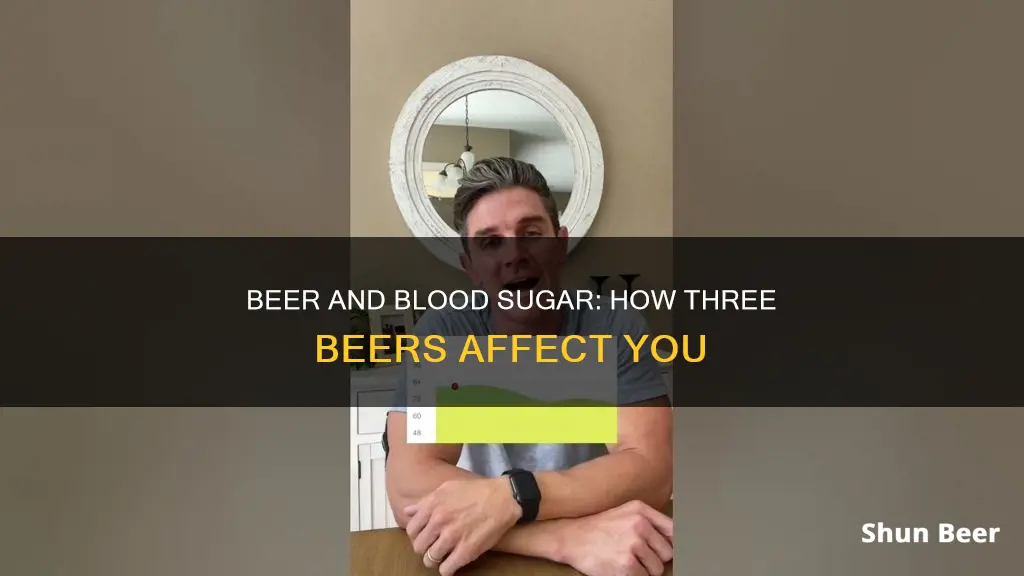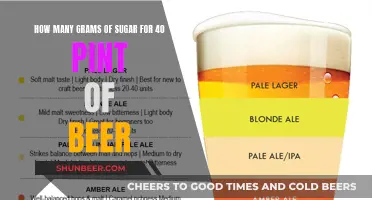
Alcohol can have a significant impact on blood sugar levels, and this effect is particularly notable for people with diabetes. Beer contains carbohydrates, which are quickly absorbed into the bloodstream, leading to increased glucose levels. The impact of alcohol on blood sugar can last up to 12 hours after the last drink. For people with diabetes, drinking alcohol can cause blood sugar levels to drop dangerously low, a condition known as hypoglycemia. This can lead to symptoms such as fatigue, sweating, irregular heartbeat, confusion, and even seizures. Additionally, alcohol interferes with the body's ability to regulate blood sugar and can affect the effectiveness of diabetes medications. It is recommended that people with diabetes drink in moderation and monitor their blood sugar levels before, during, and after drinking.
| Characteristics | Values |
|---|---|
| Number of beers that constitutes moderate drinking | 1-2 beers per day for men, 1 beer per day for women |
| Alcohol content of beer | 5% alcohol content for a 12 oz beer |
| Carbohydrate content of beer | 3.2-13.9 grams of carbs for a 12 oz beer |
| Calorie content of beer | 114-148 calories for a 12 oz beer |
| Effect of beer on blood sugar levels | Beer can increase or decrease blood sugar levels |
| Effect of beer on appetite | Beer stimulates appetite and may cause overeating |
| Effect of beer on weight | Beer may contribute to weight gain due to its calorie content |
| Effect of beer on diabetes medications | Beer can interfere with diabetes medications and make them less effective |
What You'll Learn

Beer contains carbohydrates that increase blood sugar levels
Beer contains carbohydrates, which are absorbed into the bloodstream relatively quickly, leading to increased glucose levels. Usually, elevated blood sugar is seen shortly after consuming alcohol. The impact of beer on blood sugar levels depends on the type of beer and the amount consumed.
Regular lagers tend to vary in carbohydrate content from about 10 to 15 grams per pint. Some light beers may contain less than 10 grams of carbohydrates per pint, and a few have less than 5 grams. Pilsners are thought to have a relatively benign effect on blood sugar, but it's always good to test to be sure of the effect on your blood glucose levels. Stouts, Porters, and Guinness tend to be on the higher end of the carbohydrate spectrum among beers, with over 20 grams of carbohydrates per pint.
The calorie content, alcohol content, and number of carbohydrates in different beers vary, and these factors play a role in how they affect your blood sugar levels and weight management. For example, a 12-ounce bottled beer typically has around four to five percent alcohol by volume (ABV), while a craft beer can have up to 10 percent ABV. Craft beers usually have more calories and are generally higher in carbohydrate content than bottled beers.
The impact of alcohol on blood sugar levels is not limited to the amount of carbohydrates in the drink. Alcohol interferes with blood sugar regulation by affecting the hormones that regulate these levels. According to internal medicine physician Dr. Kelvin Fernandez, "alcohol diverts metabolic pathways, disrupting glucose production in the liver, and contributing to low blood sugar. It can also decrease insulin sensitivity, impacting the body's ability to regulate blood sugar effectively."
Additionally, alcohol stimulates the appetite, so you may unknowingly consume more food and further increase your blood glucose levels. Alcohol can also affect diabetes medications, making them less effective. Therefore, it is essential to understand how beer and other alcoholic beverages impact your blood glucose levels and to consume them in moderation.
Beer and Blood Sugar: What's the Connection?
You may want to see also

Alcohol interferes with blood sugar regulation
The liver is responsible for storing and releasing glucose into the bloodstream to maintain healthy blood sugar levels. When you consume alcohol, the liver prioritizes breaking it down instead of releasing glucose, leading to unstable blood sugar levels that can drop too low. This risk is heightened when drinking on an empty stomach, as the liver has to work harder to remove alcohol from the blood, further disrupting blood sugar regulation.
Additionally, alcohol stimulates the appetite, which may lead to overeating and subsequent increases in blood sugar levels. It can also affect judgment, making it harder to maintain a balanced diet and control blood sugar. Alcoholic drinks are often high in calories, which can hinder weight loss and contribute to elevated blood sugar levels.
Furthermore, alcohol can interfere with the effectiveness of diabetes medications, including oral diabetes medicines and insulin. It can reduce the liver's ability to convert proteins and fats into carbohydrates, particularly during periods of increased energy demand such as exercise or between meals. This interference can worsen diabetes-related complications like disturbances in fat metabolism, nerve damage, and eye disease.
Therefore, it is crucial for individuals with diabetes to drink in moderation and only when their blood sugar levels are well-managed. Consulting a doctor is advisable to understand the specific risks associated with alcohol consumption and to ensure it does not negatively impact their health or medication effectiveness.
Sour Beers: High Sugar Content or Healthy Choice?
You may want to see also

Alcohol stimulates the appetite, which can lead to overeating
Alcohol can indeed stimulate the appetite, which can lead to overeating and, in turn, an increase in blood sugar levels. This is due to the effect that alcohol has on the hormones responsible for regulating hunger and fullness.
A 2001 study found that alcohol inhibits the body's secretion of leptin, a hormone that inhibits hunger and makes us feel full. In contrast, a 2005 study found that alcohol decreased the amount of ghrelin, the so-called "hunger hormone", in the blood. This suggests that the effects of alcohol on our feelings of fullness are complex and influenced by multiple variables.
Furthermore, a 2017 study by the Francis Crick Institute in the UK found that ethanol alcohol fired up certain neurons, called AgRP, located in the hypothalamus, which increased appetite in mice. The researchers believe that a similar reaction happens in humans. They repeated the experiment, blocking the AgRP neuron signals, and found that the mice ate less, suggesting that these neurons may influence binge eating when binge drinking.
In addition to the direct hormonal effects of alcohol, there are also psychological factors at play. Many people associate drinking with eating, particularly less healthy foods. This association is so strong that, in one study, participants who consumed alcohol-free beer (without being told it was alcohol-free) subsequently increased their caloric intake more than those who drank juice.
It is worth noting that the effect of alcohol on appetite is not universally supported by scientific evidence. A review of eight studies found that only one showed a significant difference in appetite ratings between the alcohol and no-alcohol groups. However, three out of the eight studies did find a significant difference in energy intake following a high-dose alcohol preload compared to a no-alcohol preload.
Beer's Sugar Impact: What Happens in the Body?
You may want to see also

Alcohol can cause weight gain
The calories in alcoholic drinks can add up quickly, especially when consumed in large quantities or combined with sugary mixers. Even drinks that are typically considered low-calorie, such as beer, can contribute to weight gain over time. Additionally, alcohol can lead to increased consumption of high-calorie foods. It stimulates your appetite and may affect your willpower, making it harder to stick to a healthy diet.
Furthermore, alcohol can interfere with the body's ability to regulate blood sugar. It can cause blood sugar levels to drop, especially if consumed on an empty stomach, or raise them too high when consumed with a large meal. This disruption in blood sugar control can also contribute to weight gain.
For people with diabetes, it is crucial to monitor both alcohol consumption and blood sugar levels carefully. Alcohol can reduce the effectiveness of diabetes medications and increase the risk of hypoglycemia, or low blood sugar. It is recommended to drink in moderation and only when blood sugar levels are well-managed.
Additionally, alcohol can have physical impacts, such as increasing triglyceride levels (fat in the blood) and blood pressure. These effects can further contribute to weight gain and impact overall health.
Sweetening Carbonated Beer: Sugar Quantity for 16 Oz
You may want to see also

Alcohol can affect diabetes medications
Alcohol can affect the effectiveness of diabetes medications. Alcohol may interfere with hypoglycemic medications, making them less effective. For instance, medications like chlorpropamide, metformin, and troglitazone, which are used to treat type 2 diabetes, can have lethal side effects when mixed with alcohol.
Additionally, alcohol can reduce the effectiveness of insulin, a hormone that is crucial for regulating blood sugar levels. Insulin is produced in the pancreas and helps to lower blood sugar levels by promoting the uptake of glucose into muscles and fat tissue. Alcohol consumption can interfere with the pancreas's ability to produce and release insulin, leading to higher blood sugar levels.
Furthermore, alcohol can also impact the liver's ability to regulate blood sugar levels. The liver is responsible for storing and releasing glucose into the bloodstream, but when a person consumes alcohol, the liver prioritizes breaking down alcohol instead of releasing glucose. This can lead to unstable blood sugar levels and an increased risk of hypoglycemia, especially when drinking on an empty stomach.
It is important for individuals with diabetes to understand the risks associated with alcohol consumption and how it can affect their blood sugar levels and medication effectiveness. They should consult their doctor to determine if drinking alcohol is safe for them and to get guidelines based on their specific health concerns.
Beer's Sweet Secret: Sugar Content Explored
You may want to see also
Frequently asked questions
The recommended amount of alcohol in one day is up to two drinks for men and one for women.
Drinking alcohol can cause hypoglycemia, weight gain, and physical impacts such as increased blood pressure. It can also interfere with diabetes medication and worsen diabetes-related complications like nerve damage and eye damage.
It is recommended to drink in moderation, only when your diabetes and blood sugar levels are well-managed, and with a meal that includes carbohydrates. Avoid drinking on an empty stomach, after exercising, or if your blood sugar is already low.
Some lower-risk options for people with diabetes include red wine, dry white wine, distilled spirits like gin and vodka, and low-carb cocktails. It is best to choose drinks with fewer carbohydrates and avoid sweet mixers or juices.







